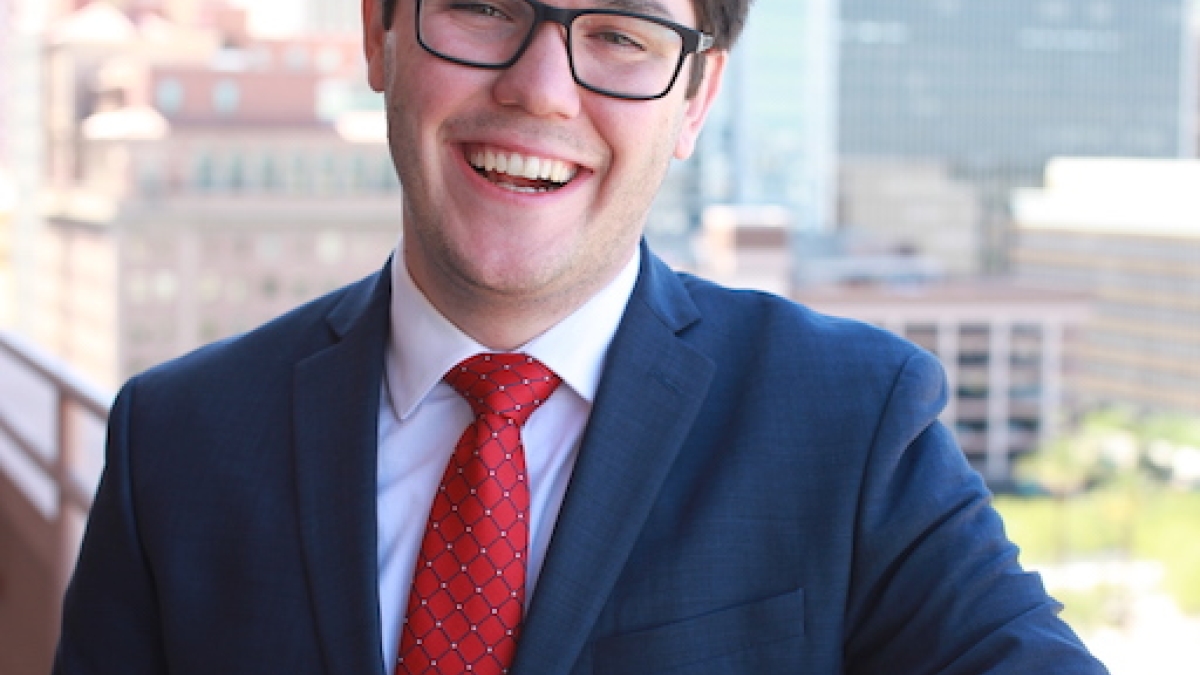ASU senior wins prestigious Marshall Scholarship

Frank Smith has won a prestigious Marshall Scholarship that will allow him to pursue a master's degree at Oxford University in the U.K.
Frank Smith III, an Arizona State University senior majoring in political science and public policy, is one of 43 students nationwide who have been awarded the Marshall Scholarship to pursue graduate degrees in the United Kingdom.
With support from the Marshall Scholarship, Smith will begin attending Oxford University next fall to study for a Master of Philosophy in comparative social policy.
“If you would have told me years ago that I would be in this position today, I would never have believed it,” Smith said.
Smith, who will graduate Arizona State University in May with bachelor’s degrees in political science and public policy with a concentration in business, was offered both the prestigious 2018 Marshall and Schwarzman Scholarships. Smith chose to accept the Marshall Scholarship. (He also interviewed for the Rhodes Scholarship.)
“Both are phenomenal opportunities and it was an honor to be offered (both), but Marshall is more in line with what I want to do,” he said.
The Marshall Scholarship, funded mainly by the British government, aims to enable intellectually distinguished young Americans to study in the United Kingdom. The scholarship funds study for up to three years at any British institution.
Created in 1953, the scholarship began as a gesture of gratitude to the U.S. for the assistance the U.K. received after World War II under the Marshall Plan, the program that aided in Europe's economic recovery between 1948 and 1951.
Alumni include Supreme Court Associate Justices Stephen Breyer and Neil Gorsuch, and Reid Hoffman, creator of the social networking platform LinkedIn.
Smith was assisted with his application and interview preparation by staff in the Office of National Scholarship Advisement, housed in the Tempe complex of Barrett, The Honors College at ASU. ONSA assists ASU students from any college and with any major in applying for national and international scholarships.
When Smith begins his studies at Oxford it will be quite a distance geographically, physically and emotionally from where he started out.
Born to a mother with substance abuse issues and never knowing his father, Smith — a Mesa, Arizona native — had the cards stacked against him from the beginning. His situation worsened when his mother could no longer care for him and his stepfather became abusive. He ended up in foster care where the neglect and abuse continued. Smith said that throughout his youth, he lived in 27 different places that he called "home", including staying with friends, in homeless shelters and foster care.
“Stability was definitely not part of my childhood,” he said.
When Smith was 17, a distant relative took him in and provided the home and stability he so desperately craved.
“At that point I was able to heal from the experience of being in the foster system. I had been in a foster home where I was not able to interact with my peers normally, take healthy risks, and be a normal teen,” he said.
He took advantage of that stability by enrolling in honors and AP classes, applying for scholarships and becoming involved in extracurricular activities. Overall, his goals at that point were simple.
“I wanted to do well in high school, get at least a 3.2 GPA, graduate, and go to college,” he said.
He was able to accomplish those goals and enter into ASU as an Armstrong Scholar, an Obama Scholar, a Spirit of Service Scholar and a Nina Mason Pulliam Scholar. ASU is where he really thrived, and came into his own.
He was elected the youngest student body president ever at the ASU Downtown Phoenix campus.
He found a passion for working on behalf of foster children and played a role in the passage of Arizona Senate Bill 1208, the Foster Care Tuition Waiver, and other pieces of legislation that are now improving outcomes for former foster youth.
Smith served as a field organizer for Hillary Clinton’s presidential campaign in Grand Rapids, Michigan in 2016. He now is a policy advisor for David Garcia, who is running for governor of Arizona on a strong education platform.
He is a fellow with the Annie E. Casey Foundation working on policy affecting foster youth. He went to Ghana during the summer of 2017 to work with the Ghana Center for Democratic Development and wrote a policy memorandum to brief Ghanaian diplomats in support of a $6 billion infrastructure investment plan for Africa.
“That experience in Ghana made me realize I needed to look at policy not just from a local point of view, but from a more global perspective,” he said.
He plans to make that perspective a part of his studies at Oxford, where he will focus in-depth on social policies that have global impact. His future goal is to work in the area of public policy, particularly foster care reform, and ultimately as a chief of staff in the White House or on Capitol Hill.
No matter where or how far he goes, Smith said he will keep in mind where he started.
Only 10 percent of foster youth will go to college and only about three percent graduate, Smith said.
“I always knew the numbers were against me, but I also knew it could be different. I definitely don’t think I would be here without the teachers and mentors who believed in me, and I’m grateful,” he said. “I want to be a role model for foster children and show them they can hope for something better and achieve it.”
More Law, journalism and politics

Annual John P. Frank Memorial Lecture enters its 26th year
Dahlia Lithwick, an MSNBC analyst and senior legal correspondent at Slate, is the featured speaker at the School of…

The politics behind picking a romantic partner
A new study reveals the role that politics play when picking out a romantic partner — particularly for older adults.“Findings…

Tips to make tax season less taxing
When it comes to highly unpleasant experiences, filing taxes is probably up there with root canals — which is why people put off…

